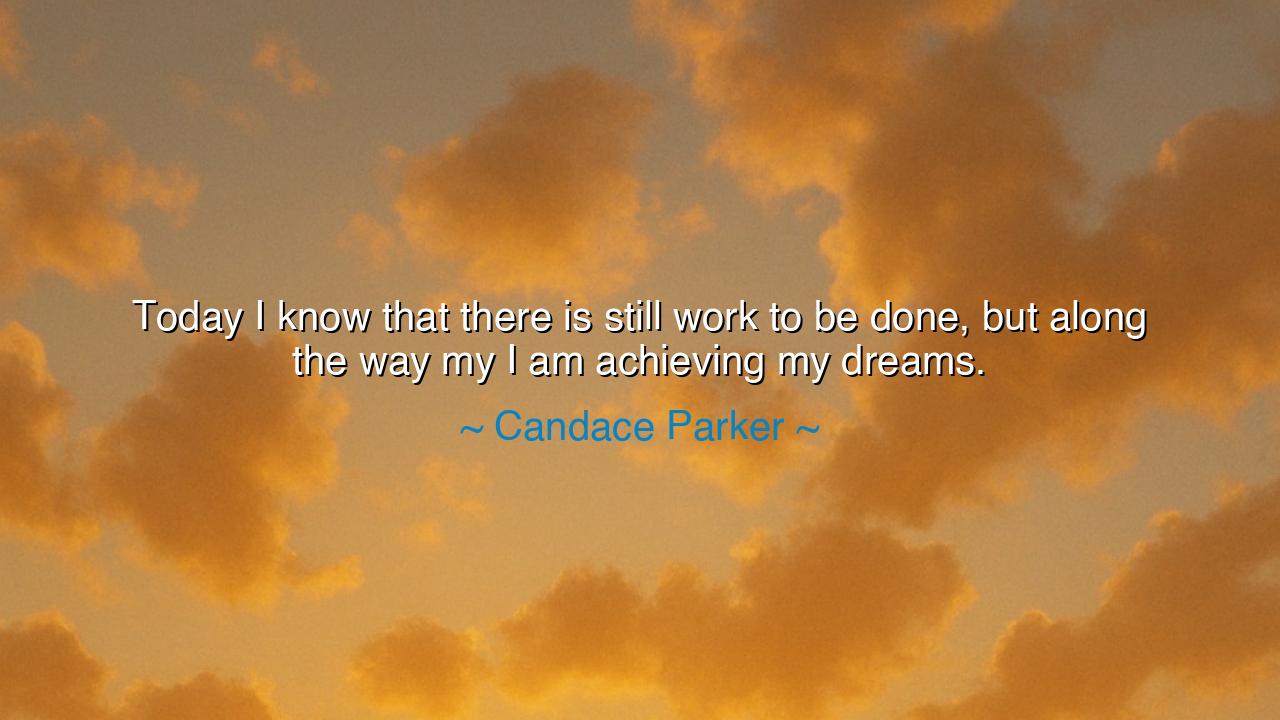
Today I know that there is still work to be done, but along the
Today I know that there is still work to be done, but along the way my I am achieving my dreams.






When Candace Parker, the trailblazing athlete and symbol of perseverance, declared, “Today I know that there is still work to be done, but along the way I am achieving my dreams,” she spoke not only as a champion of sport, but as a philosopher of effort, a bearer of timeless wisdom disguised in the language of progress. Her words carry the rhythm of one who walks between fulfillment and striving, between what is and what may yet be. In them lies the sacred balance between ambition and gratitude—the understanding that the road to greatness is not merely a destination, but a living journey.
To the ancients, such wisdom would have been honored as the Doctrine of Becoming, the eternal truth that all achievement is both seed and harvest, both step and summit. Candace Parker’s life embodies this principle. From her days as a young girl in Illinois, shooting hoops beneath the wide sky, to her rise as an Olympic gold medalist and WNBA champion, she has walked a path of labor and light. Yet, even after scaling the peaks of victory, she does not speak of completion, but of continuation. “There is still work to be done,” she reminds us—an echo of the ancient hero who, after conquering the dragon, looks not for rest, but for purpose renewed.
Her words recall the wisdom of Odysseus, the wanderer of Homer’s epic, who, after winning the Trojan War, faced years of toil before finding his way home. Each trial revealed to him not defeat, but deeper mastery. So too does Parker’s reflection remind us that life’s greatest victories are not final—they are foundations for greater striving. True heroes, whether on the battlefield or the basketball court, understand that achievement is not an end, but a beginning. They celebrate their progress with humility, knowing that dreams evolve, and the soul, if it is to remain alive, must keep reaching.
The phrase “along the way I am achieving my dreams” holds a radiant humility. It tells us that the present moment, often overlooked by the impatient, is already part of the dream fulfilled. Too many chase the summit and forget the beauty of the climb; too many see success only in the final crown. But Parker teaches that the dream does not live in the trophy—it lives in the sweat, the discipline, the laughter shared with teammates, the silent mornings of practice. The journey itself is sacred, for it shapes the dream into something richer than the dreamer once imagined.
Consider the story of Nelson Mandela, who spent 27 years in prison dreaming of freedom. Many might have seen that long confinement as failure or pause. Yet Mandela, like Parker, saw that even there, along the way, he was already achieving his dream—cultivating patience, faith, and vision. By the time he walked free, the victory was not merely political but spiritual. He had become the dream he sought. In the same way, Parker’s quote reveals a profound truth: becoming is as noble as arriving, and each moment of struggle is a fragment of the triumph itself.
This is the wisdom that the modern soul must reclaim. In an age of haste, when people measure worth by milestones and applause, Parker’s voice is a gentle thunder calling us back to the rhythm of growth. “There is still work to be done,” she says—not with exhaustion, but with reverence. To her, the unfinished task is not a burden but a gift—the sign that life still invites her to create, to improve, to teach, to inspire. This is the spirit of the craftsman, who hammers not for completion, but for excellence; the artist, who paints not for fame, but for love of creation.
So let us draw this lesson as if it were carved upon the walls of time: Rejoice in the work, for the work is the dream unfolding. Do not despise the distance still to travel, for every step already holds the glow of achievement. Like Candace Parker, let us wake each day knowing that our journey is both unfinished and glorious—that the struggle itself is proof that we live with purpose.
For in the end, the wise do not ask, “Have I reached my dream?” but rather, “Am I living it, even now?” To live as Parker does—to labor joyfully, to celebrate progress, and yet to remain hungry for growth—is to walk in the eternal rhythm of heroes. And to those who listen deeply, her words whisper the truest victory of all: that the dream is not a place we arrive, but a life we create—one step, one day, one breath at a time.






AAdministratorAdministrator
Welcome, honored guests. Please leave a comment, we will respond soon